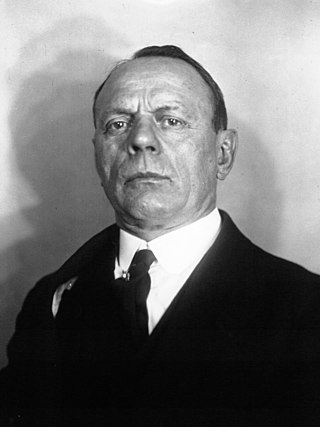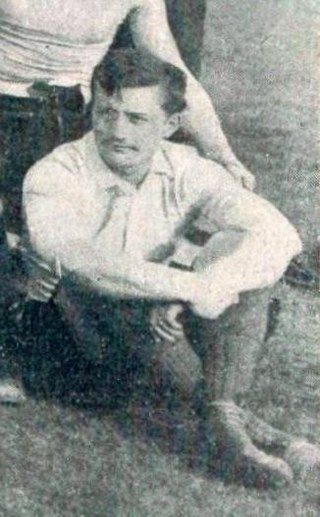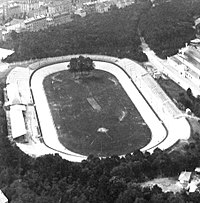
A tug of war tournament was held on 16 July at Catalan Cross, Boulogne Forest in Paris as part of the 1900 Summer Olympics. The only match of the tournament was between a mixed team from the Racing Club de France, consisting of five French and one Colombian athlete, and a mixed team consisting of three Danish athletes and three Swedish athletes. The mixed Scandinavian team won the match 2–0.

Rugby union has been a men's medal sport at the modern Summer Olympic Games, being played at four of the first seven competitions. The sport debuted at the 1900 Paris games where the gold medal was won by the host nation. It was subsequently featured at the London games in 1908, the Antwerp games in 1920 and the Paris games in 1924.
Rugby league nines is a version of rugby league football played with nine players on each side. The game is substantially the same as full rugby league, with some differences in rules and shorter games. Nines is usually played in festivals, as its shorter game play allows for a tournament to be completed in a day or over a single weekend.

François Étienne "Frantz" Reichel was a French sports administrator, athlete, cyclist and journalist. He competed at the 1896 Summer Olympics in Athens as a runner and at the 1900 Summer Olympics in Paris as a rugby union player. He co-founded the Association Internationale de la Presse Sportive (AIPS), and served as its first president in 1924–1932.

France was the host of the 1900 Summer Olympics in Paris. France was one of many nations that had competed in the 1896 Summer Olympics in Greece and had returned to compete at the 1900 Games.

The United Kingdom of Great Britain and Ireland competed as Great Britain at the 1900 Summer Olympics in Paris, France. It was the second appearance of Britain after having participated in the inaugural 1896 Games. In Olympic competition, the nation has always shortened its official name to Great Britain rather than the United Kingdom seen elsewhere.

The Germany national rugby union team represents Germany in men's international competitions. It currently plays at the second level of European rugby but is yet to qualify for the Rugby World Cup. The national team first played in 1927, with rugby union in Germany being administered by the German Rugby Federation.

Racing 92 is a French professional rugby union club based in the Hauts-de-Seine department, Paris' western inner suburbs that competes in Top 14. The club plays its home matches at the 30,681-capacity domed stadium Paris La Défense Arena, located near the La Défense business district.
The French national rugby union team first competed at the 1900 Summer Olympics.
Raymond Whittindale was a British rugby union player who competed in the 1900 Summer Olympics. He was a member of the British rugby union team, which won the silver medal.

Jean Collas was a French rugby union player and tug of war competitor, who competed in the 1900 Summer Olympics. He was a member of the French rugby union team, which won the gold medal. He also participated in the tug of war competition and won a silver medal as a member of the French team.

Léon Binoche was a French rugby union player who competed in the 1900 Summer Olympics. He was a member of the French rugby union team, which won the gold medal. His great-niece is the actress Juliette Binoche.
Moseley Wanderers represented Great Britain at the 1900 Summer Olympics at rugby union. They played one game, losing 27–8 to France, winning the Silver medal.

The 2003 Rugby World Cup was the fifth Rugby World Cup and was won by England. Originally planned to be co-hosted by Australia and New Zealand, all games were shifted to Australia following a contractual dispute over ground signage rights between the New Zealand Rugby Union and Rugby World Cup Limited. The pre-event favourites were England, regarded by many at the time as the best team in the world. New Zealand, France, South Africa and defending champions Australia were also expected to make strong showings, with New Zealand being second favourites after victory in the southern-hemisphere Tri-Nations championship.

Pierre Guillemin was a French rugby union player, who represented France, Paris and Racing Club de France (RCF).
The 2008 Australia rugby union tour was a series of seven matches played by the Australia national rugby union team in November–December 2008. The tour was preceded by a match against All Blacks for the Bledisloe Cup and closed with a match against Barbarian FC
Robert James du Preez is a South African professional rugby union player for English Premiership side Sale Sharks. His regular position is fly-half.

The men's rugby sevens tournament at the 2016 Summer Olympics was held in Brazil. It was hosted at the Deodoro Stadium, a temporary outdoor stadium constructed as part of the Deodoro Modern Pentathlon Park in Rio de Janeiro. The tournament was held from 9 August to 11 August 2016, starting with group matches before finishing with the medal ceremony on 11 August. The 2016 Games marked the first time that rugby sevens has been played at the Olympics, and the first time since 1924 that any form of rugby had been played at the Olympics.

Leslie Hood was an English rugby union player. He competed at the 1900 Summer Olympics and won silver as part of the Great Britain team in what was the first rugby union competition at an Olympic Games. He also competed in amateur catch-as-catch-can wrestling competitions and played ice hockey at Manchester. He was born in York, the third son of William Hood, a general practitioner in practice at Castlegate, York. Along with his three brothers, he was educated at St Peter's School, York. He was a good all-round sportsperson but not as academically gifted as his siblings.
Dewald Dawid Human is a South African rugby sevens player, currently playing with the South Africa national team. He can play as a fly-half or fullback.

















